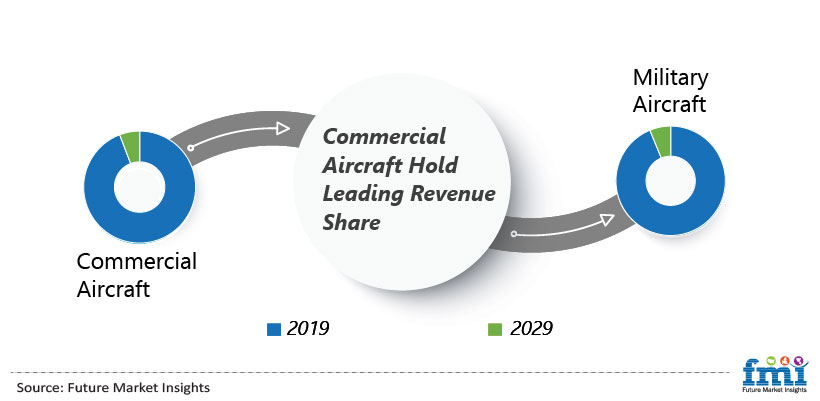Passenger traffic in the aircraft industry continues to register growth rates above historical averages, supported by the reduced price of travel and increasing middle-class population in developing markets. This rise is playing a crucial role in driving the growth of the global aircraft tube and duct assemblies market.
The global aircraft tube and duct assemblies market is projected to expand at a CAGR of 4% during the forecast period of 2019-2029.

Request a Sample of this Report @ https://www.futuremarketinsights.com/reports/sample/rep-gb-3716
Key Takeaways of Aircraft Tube and Duct Assemblies Market Study
- Aerospace industry is increasing the usage of aluminum in aircraft tube and duct assemblies, as aluminum is a lightweight and high-strength material. In the global aircraft tube and duct assemblies market, aluminum holds approximately one-third market share.
- Tier-I manufacturers operating in the global aircraft tube and duct assemblies market are Eaton, Exotic Metals Forming, Leggett & Platt, Incorporated, and PFW Aerospace GmbH. On the other hand, AMETEK. Inc., Smiths Group PLC, Sigma Precision Components Ltd., and some other players are estimated to stand in the tier-II bracket in the global aircraft tube and duct assemblies market.
- Key players are focusing on the expansion of their footprints by establishing manufacturing units and distribution channels in various regions.
- Global defense spending is at a high record. The biggest spenders on defense are the U.S., China, France, Saudi Arabia, and India. Implementation of advanced, combat, and stealth-based aircraft procurement programs has augmented military spending, worldwide. This growing trend is expected to upsurge the demand for aircraft tube and duct assemblies.
- Development of lightweight materials and increasing sales of aircraft are anticipated to drive the growth of the market over the forecast period.
“Original equipment manufacturers (OEMs) are projected to hold more than 90% share in the global market, as the replacement of tube and duct assemblies is found to be very limited.”
We Offer tailor-made Solutions to fit Your Requirements, Request Customization@ https://www.futuremarketinsights.com/customization-available/rep-gb-3716
AIRCRAFT TUBE AND DUCT ASSEMBLIES MARKET TAXONOMY
Application
- Engine Bleeds
- Thermal Anti-ice
- Pylon Ducting (HVAC) Enamel
- Fuselages
- Inlets/Exhausts
- Environment Control Systems (ECS)
- Lavatories
- Waste Systems
Aircraft Type
- Commercial Aircraft
- Narrow Body Aircraft
- Wide Body Aircraft
- Regional Jets
- Freighters
- Military Aircraft
Material
- Steel
- Nickel
- Titanium
- Aluminum
- Composite
- Inconel
Sales Channel
- OEMs
- Aftermarket
Region
- North America
- Latin America
- Europe
- South Asia
- East Asia
- Oceania
- MEA
Direct Purchase of this Report@ https://www.futuremarketinsights.com/checkout/3716
Table Of Content
1. Executive Summary
1.1. Global Market Outlook
1.2. Global Segmental Overview
1.3. Demand Side Trends
1.4. Supply Side Trends
1.5. Technology Roadmap
1.6. Analysis and Recommendations
2. Market Overview
2.1. Market Coverage / Taxonomy
2.2. Market Definition / Scope / Limitations
3. Key Market Trends
3.1. Key Trends Impacting the Market
3.2. Product Innovation / Development Trends
4. Key Success Factors
4.1. Product Adoption / Usage Analysis
4.2. Product USPs / Features
4.3. Strategic Promotional Strategies
5. Global Aircraft Tube and Duct Assemblies Market Demand Analysis 2014-2018 and Forecast, 2019-2029
5.1. Historical Market Volume (Units) Analysis, 2014-2018
5.2. Current and Future Market Volume (Units) Projections, 2019-2029
5.3. Y-o-Y Growth Trend Analysis
Market Landscape Moving towards Consolidation
The aircraft tube and duct assemblies market is expected to be dominated by tier-I manufacturers, who hold more than 50% share of the global market. Prominent players involved in the global aircraft tube and duct assemblies market are shifting their focus on repair solutions rather than replacement products with full-service. This has resulted in providing approximately 50 percent or more cost reduction.
